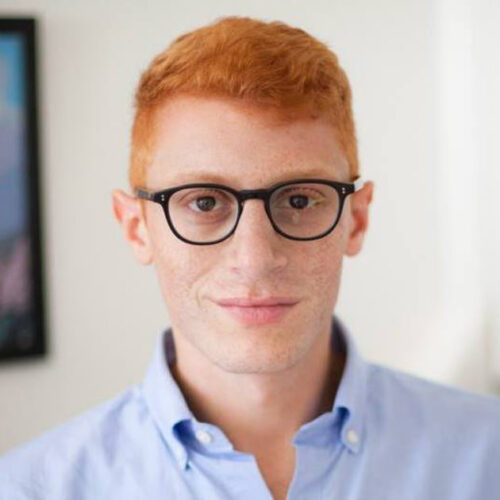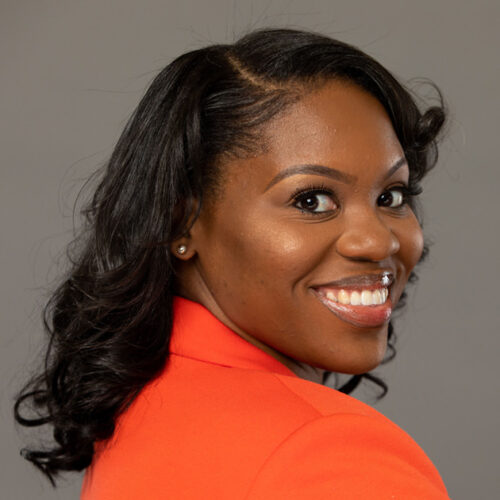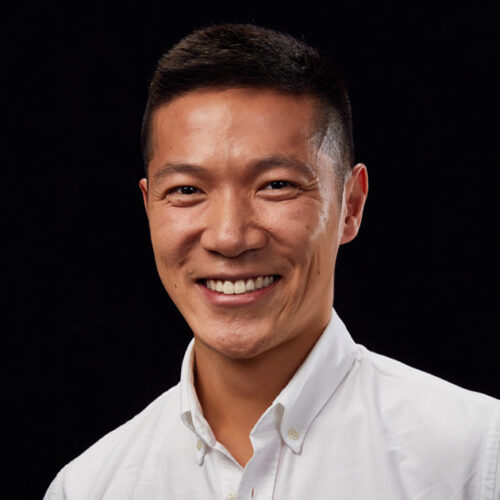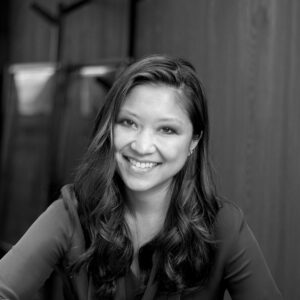16 Under 16: Meet The 74’s 2022 Class of STEM Achievers
These are some of the country's most impressive teen thinkers and doers in science, technology, engineering and math right now
By Emmeline Zhao | July 31, 2022This spring, we asked for the country’s help identifying some of the most impressive students, age 16 or younger, who have shown extraordinary achievement in the fields of science, technology, engineering and mathematics.
After an extensive and comprehensive selection process, we’re thrilled to introduce this year’s class of 16 Under 16 in STEM. The honorees range in age from 12 to 16, specialize in fields from medicine to agriculture to invention, and represent the country from coast to coast.
From the broad pool of nominations, our independent panel of judges made their selections based on three major criteria:
- Creativity: The student demonstrates ingenuity and the ability to design something new and disruptive. The student considers things that haven’t been done before and embraces the unexpected.
- Changemaking: The student demonstrates initiative with consideration to social issues, equity, and the capacity to inspire change in others and within their community.
- Resilience: The student demonstrates the ability to persevere by using challenges as opportunities for growth. The student displays grit by always moving toward their goals despite difficulties encountered along the way.
These three qualities were like “the spark, the light and the flame” for each student’s work in STEM, said judge Mason Tang, an engineering manager for Grammarly. (Meet all three judges here.)
Many of these teens have otherwise been recognized for their achievements with a variety of awards from countless organizations. Here, rather than listing their accolades, we’d like to highlight the work that they have done and what their nominators had to say about them. We hope that these incredible youngsters can inspire others — and offer hope that our future can be in pretty good hands. Please meet The 74’s 2022 class of 16 Under 16 in STEM (click on portraits below to jump directly to each honoree’s biography):
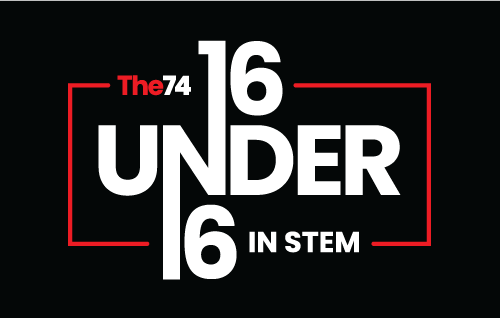
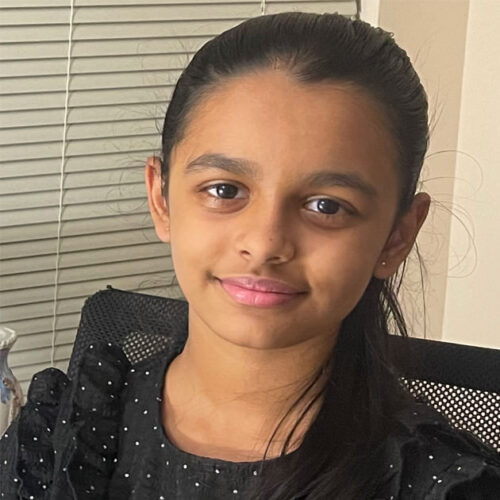
Johns Creek, GA
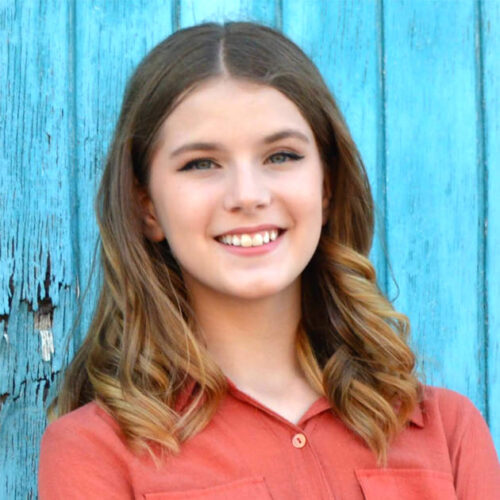
Wilson, NC
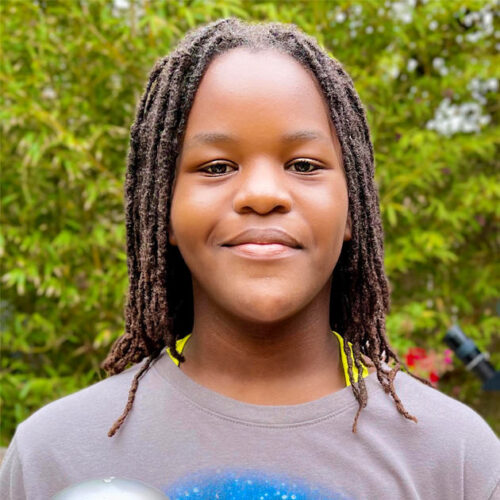
Long Beach, CA
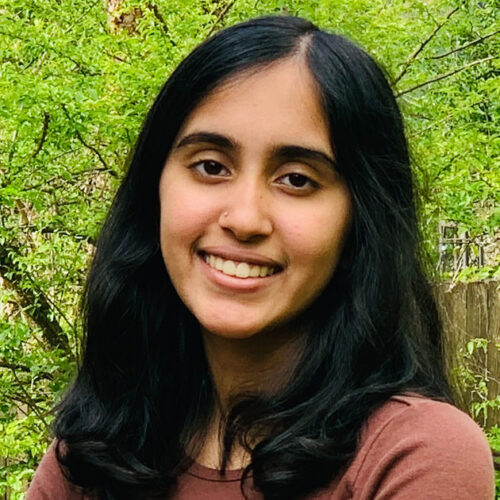
Redmond, WA
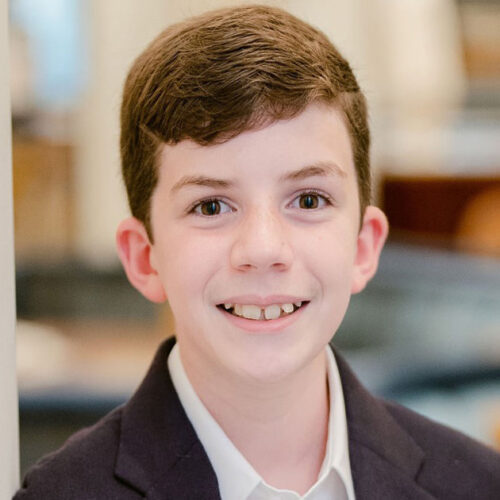
Bronx, NY
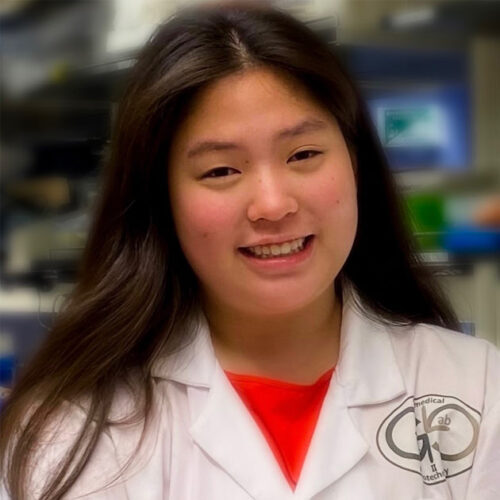
McLean, VA
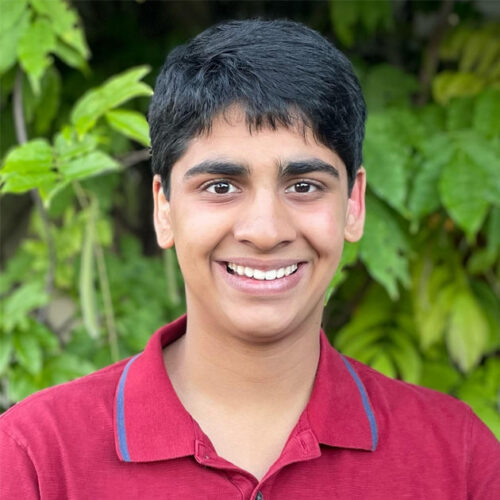
Redwood City, CA
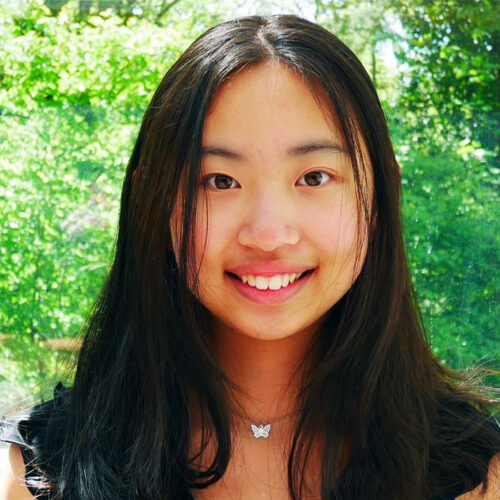
Kenmore, WA
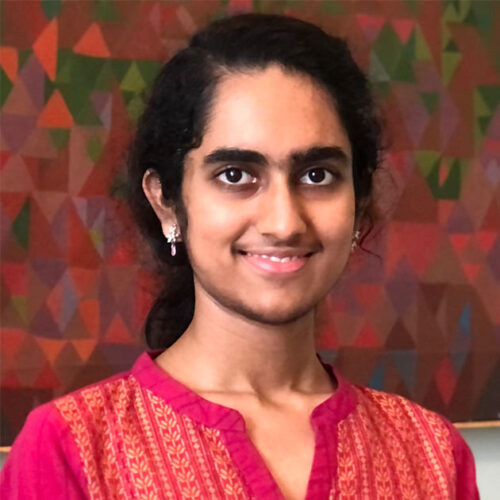
Concord, NH
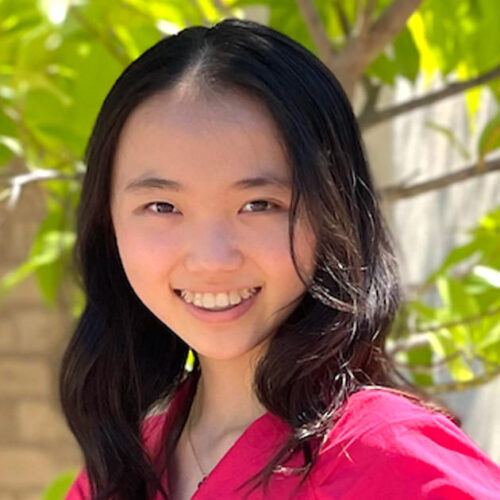
Fullerton, CA
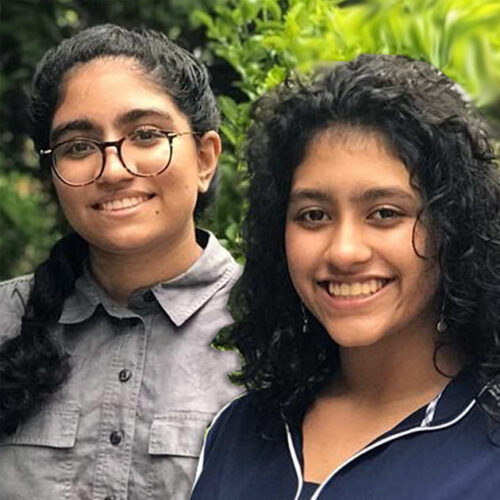
Jersey City, NJ
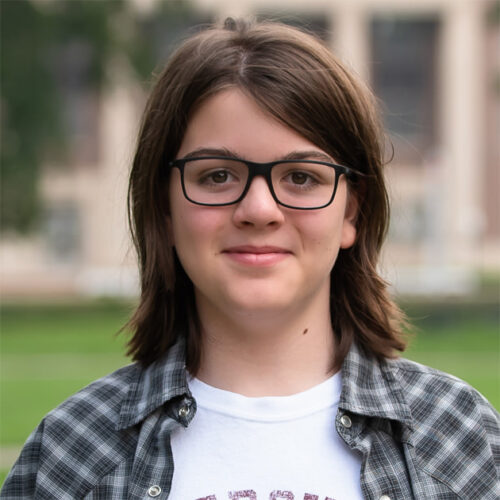
Minneapolis, MN
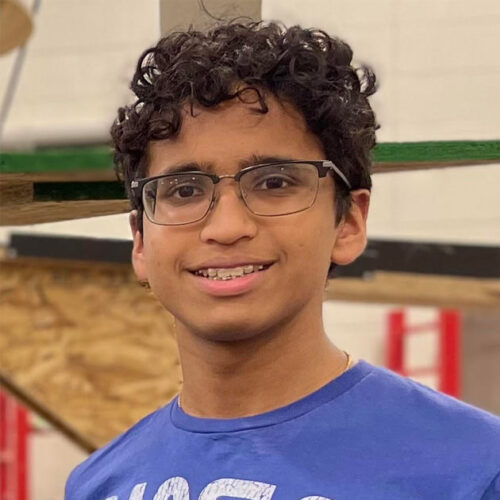
Novi, MI
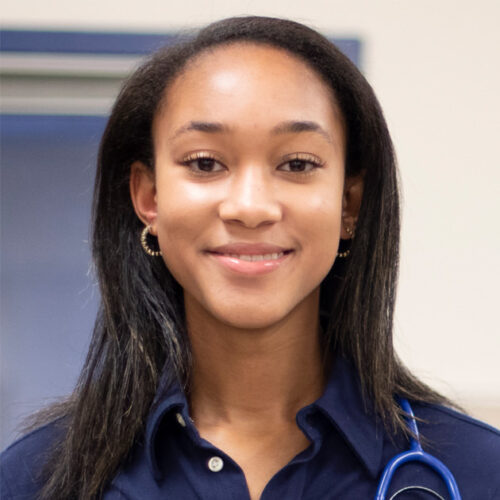
San Jose, CA
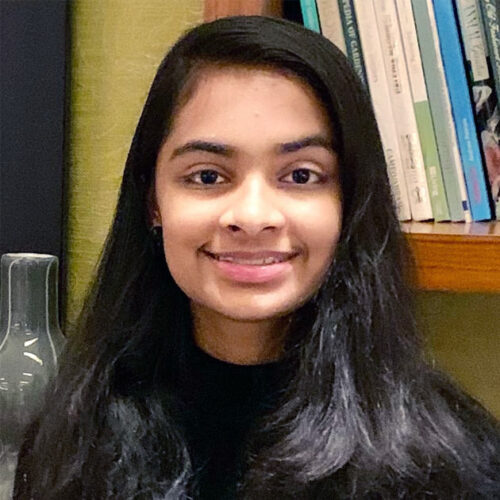
Old Bridge, NJ
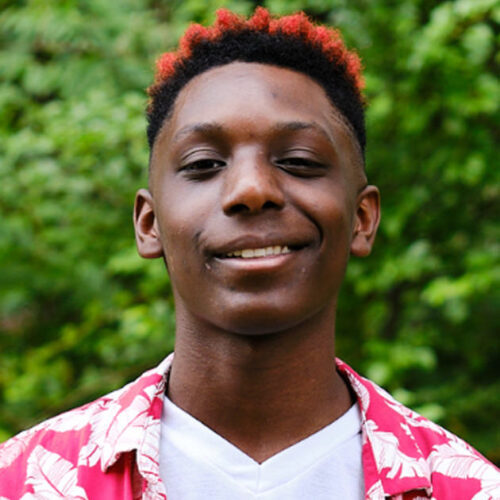
Atlanta, GA
AESHA BHATT, 12
River Trail Middle School ■ Johns Creek, Georgia
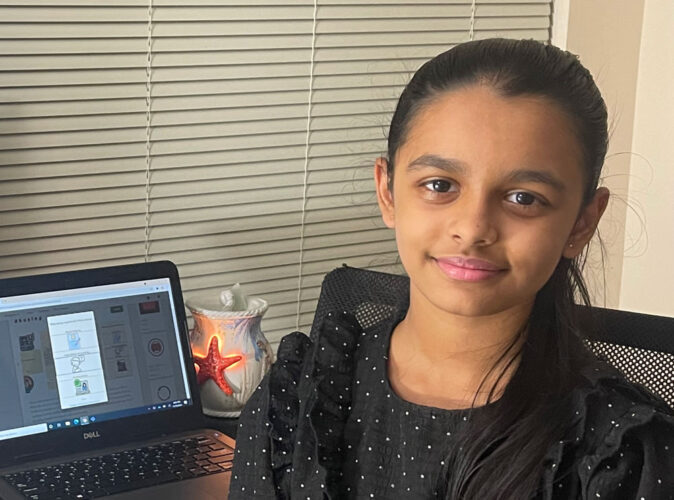
Aesha Bhatt immigrated to the U.S. from India with her parents just five years ago, and already she’s making waves in her new country. During the pandemic, when school and extracurricular activities were scarce, she sought additional stimulation by way of BYJU’s FutureSchool, an online technology and coding program for youth.
For her capstone project to complete the program, Aesha created an app that allows students to digitally report instances of bullying. Having seen her peers harassed in school and too afraid to speak up to an adult in person, she felt that a tech-based approach might increase incident reporting and reduce instances of bullying. Her Anti-Abusing App is available for download on the Google Play store, and Aesha is working on getting it into Apple’s App Store.
“Aesha was able to think beyond her own experience to help the world feel a bit safer for her peers by creating something like an app to solve a real-world issue,” said her nominator, Catherine McNally, PR director, North America, for BYJU’S FutureSchool.
Aesha’s now helping her mom Hita Bhatt develop a YouTube cooking channel by editing the channel’s pages and adding special features in cooking videos. She’s also working on another app that would give tourists essential words and phrases to know in native languages when visiting foreign countries.
LYDIA DENTON, 14
Sallie B Howard School ■ Wilson, North Carolina
Wilson, North Carolina, is a city of 50,000 where the leading industries include manufacturing and construction. Here, Lydia Denton is a teen inventor whose personal challenges inspire her creations. She’s on a mission to get girls interested in STEM.
Lydia has life-threatening allergies and suffers from severe anxiety, which causes her hair and nails to fall out. “So much of her life feels out of her control, but instead of letting these things overwhelm her or define her, she uses them as fuel for inventions,” said her nominator and mother, Covey Denton, K-8 STEM specialty teacher at Sallie B Howard School in Wilson.
As just one example, Lydia created what she calls a “Halcyon Bracelet” to help with body-focused repetitive behaviors, which plagued her during the COVID quarantine. The bracelet recognizes recurrent movements associated with anxiety, and delivers a warning signal when it detects the user is about to revert into those actions. She has also invented a “Beat the Heat Car Seat” that can tell when a child has been left in a car, and initiates a call to emergency services for rescue if the temperature in the vehicle becomes dangerously hot.
The teen also works to reduce e-waste, and co-founded Regame Inc., a nonprofit that collects, repairs and redistributes used gaming systems and tablets to keep them from piling up in landfills. She continues to speak to school groups and programs for girls to drum up more female interest and representation in STEM.
“Typically, science fields are male dominated,” Lydia said in an interview. “And people think, ‘Oh, it’s a science field; you shouldn’t be in it – you’re a woman.’ I try to encourage other girls to go into STEM fields if they like it. I think it’s honestly just great that women are starting to be able to find themselves in STEM and be able to pursue what they love no matter what other people think.”
HELENA DONATO-SAPP, 12
Westerly School of Long Beach ■ Long Beach, California
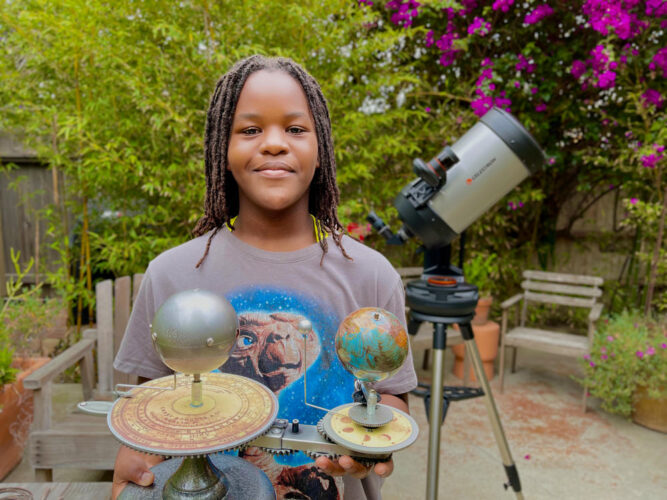
Helena Donato-Sapp is the image of a child scholar. She has published scholarly pieces in peer-reviewed journals and chapters in multiple books and magazines. She is a regular guest lecturer in college graduate courses for teacher credential candidates where she speaks on several topics, among them, how important it is for young people to tackle tough topics.
She specializes in using the social science research methodology of autoethnography by writing from her own experiences in social context to bring insight into larger issues. She regularly makes presentations at national conferences for adults on the topics of her research agendas, which currently include reflections and research on Black girlhood, disability justice and how children can decolonize their elementary curriculum.
But below the surface, Helena has multiple learning disabilities. She was born at 27 weeks, had heart surgery at 10 days old, and had bleeding in her brain, which led to an early life of medical issues. She was later diagnosed with a visual processing disorder and a working-memory disorder. She was recently retested and found to have ADHD.
Yet she is harnessing her challenges.
She wants to use her growing platform as a scholar-activist to co-create with others a more just and equitable world, and works to highlight women in STEM; she recently published an article, “Vaccines Then and Now,” for New Moon Girls Magazine, a pre-teen girl power magazine.
Helena has a goal of becoming a director and producer. Because of her specific learning disabilities, she has leaned toward technology and her love of film in an attempt to show her teachers deeper comprehension of her content.
“Her goal is to have agency in her life, to make the world a more just place, and the fact that she is bullied for her learning differences or her Blackness or for being a girl or for any of the reasons that the world attempts to look at her through a deficit lens and tell her that she is ‘less than’ has simply become the fuel to power her academic and activist passions,” writes her parent and nominator Jeff Sapp. “She is so passionate about the field of science and the use of technology. But, more so, because she is kind. And all fields — STEM included — need more kind and caring nerds among their ranks.”
VANESHA HARI, 16
Redmond High School ■ Redmond, Washington
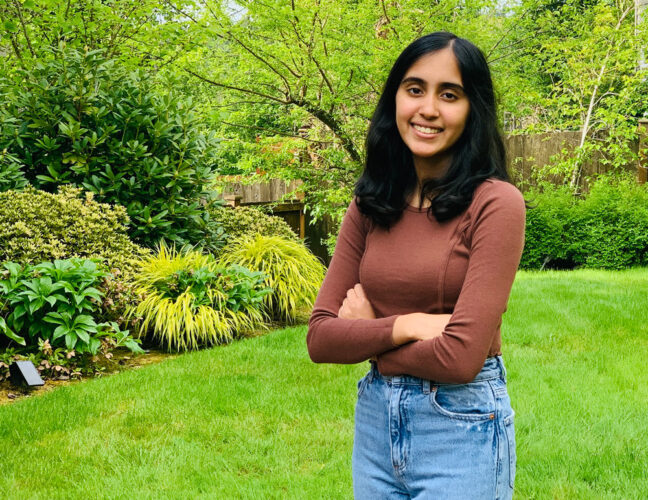
Vanesha Hari has always been a lover of STEM fields, as she got started with building Legos and solving puzzles early in childhood. It wasn’t until 2018, when she became a counselor-in-training for a class of young girls to ignite their curiosity for math, that she realized how deep the unconscious social bias runs around STEM.
The girls that she counseled told her that math was boring, and boys were much better at the subject. This experience, coupled with trips to India with her family, where she saw many girls forego an education in favor of supporting their families at home, inspired her to co-found — alongside her younger sister Varshini Hari — Joys of Giving, a nonprofit that boasts a multi-pronged mission to fight youth hunger and close gaps in educational equity, particularly by encouraging more girls to participate in STEM.
Through Joys of Giving, Vanesha has led more than two dozen STEM workshops, engaging over 200 young people by teaching coding, science, baking and art. Over four summers, she volunteered as a senior counselor with Girls Rock Math to teach math concepts to elementary-aged girls.
Vanesha distinctly remember her first robotics class, where she walked into a room full of boys on the first day, making her feel “alone and underdressed.” She later qualified for the World Robotics Championship in 2021 as the only girl on her team.
“I am now working diligently to help bring other girls along so they do not have to face the same challenges and feel like they are left [to do it] alone,” Vanesha said. “I dream of attending a university where there is potential to combine research, computing and technology with social change and leave the world better than I found it.”
STEVEN HOFFEN, 14
Riverdale Country School ■ Bronx, New York
A pre-pandemic visit to Sindyanna of Galilee, a nonprofit in Israel where Jewish and Arab women work together to foster social change and cultivate hydroponic gardens, inspired Steven Hoffen to produce a short documentary telling the story of their efforts.
Conducting interviews remotely through the onset of the pandemic, Steven was fascinated by the cross-cultural collaboration of Israeli and Palestinian women. The final film, “Growing Peace in the Middle East,” was recognized at numerous film festivals and prompted Steven to launch a nonprofit, Growing Peace, which is dedicated to using hydroponics “as a medium to educate, empower and help those in need.”
Steven was able to raise $15,000 in the nonprofit’s first year, allowing Growing Peace to fund the installation of a hydroponics system at a Tel Aviv food pantry used by Sudanese refugees in Israel who were experiencing severe food insecurity during COVID lockdowns. Growing Peace has since brought on other hydroponics adopters, all of whom are women who have lost jobs to manufacturing outsourcing or automation.
These women, Steven said, have been able to use hydroponics to feed their families and generate additional income by selling surplus produce at their local markets. Because hydroponics systems require no soil and significantly less water and space than traditional farming methods, hydroponic farming overcomes issues of land and resource scarcity in urban areas and arid places like Israel.
Since producing the documentary, Steven has kept in touch with the founder of Sindyanna of Galilee. “I asked her how the hydroponics project is going,” he said. “She said that since my film has been (shown) in different film festivals, 20 more women have joined the hydroponics project. That really just made me happy.”
Among Steven’s goals for 2022 is to bring hydroponics to schools, pantries and other organizations that help those in need, especially at home in New York City.
CHELSEA HU, 15
BASIS Independent McLean ■ McLean, Virginia
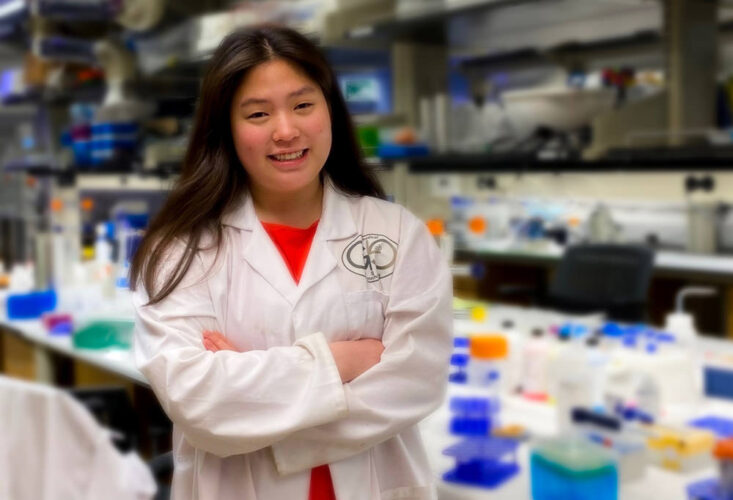
As the daughter of an Asian immigrant family, Chelsea Hu spent her childhood moving across the country nearly every school year as her parents looked for work. In this constantly evolving environment, it was difficult to plant cultural anchors and join learning and community spaces she could call home.
Chelsea’s experience has shown her that STEM is a crossroads between self and society where she may express and affirm important cultural experiences and find belonging. She has a particular scientific interest in the eastern skunk cabbage, as the plants reminded her of vetiver, on which her ancestors depended to stabilize rice paddies.
As rapid urbanization targeted her neighborhood in Northern Virginia, causing hazardous bank erosion — which in turn devastates the riparian zones that are vital to sustaining the health and diversity of local habitats — she imagined using these plants to similarly mitigate the erosion threatening her beloved trails and animal habitats.
Applying econometrics and statistical techniques to supplement her cultural vision, Chelsea pursued an independent research project to confront this overlooked disaster head-on. Through her global platform as an International Science and Engineering Fair medalist, she is sharing her work with collaborators in both South and East Asian to explore how similar native plants can be used to stabilize watersheds endangered by human development and erosion.
She is currently working with the Virginia Department of Forestry to start implementing eastern skunk cabbages as a cost-effective plant treatment in Northern Virginia’s streams to combat the harmful trends of urbanization and mismanaged stormwater. Chelsea is also now a researcher at the Paranjape Lab at Georgetown University, where she has contributed to its scientific dialogue for more than three years. She is heading a project on using silk fibroin microspheres to improve drug delivery in the lungs of infants who suffer from life-threatening neonatal respiratory disease syndrome.
Seeing many of her classmates and peer researchers struggling with mental health as the world becomes more output-oriented, challenged Chelsea emotionally. She founded Teen Mobile Arts, a global nonprofit that builds communities for young underrepresented artists around the world, in response to the dire mental health crisis.
She also organized an art exhibition of work by her fellow scientist-artists to create a space for dialogue on questions of how to find harmony between personal identity and science. Chelsea’s mission is to empower youth from marginalized communities with the knowledge that they, too, can become agents of their cultures through pursuing and leading cutting-edge STEM research.
ZIDAAN KAPOOR, 15
Homeschool ■ Redwood City, California
Zidaan Kapoor has life-threatening food allergies to eggs, nuts and seafood, to the extent that trace amounts of these foods can lead to anaphylactic shock and organ shutdown. Last year, he suffered two serious allergic reactions that put him in the hospital.
Although he recovered physically within a few days, Zidaan struggled mentally for months to trust food labels and couldn’t eat food he hadn’t personally witnessed prepared. He lost trust in the ability of his closest family and friends to keep him safe. In working through this challenge, Zidaan began to research food allergy anxiety and eventually spent the bulk of this year developing an app, Fight Fears, to address mental health issues around food allergies and intolerances.
Fight Fears aims to help young people with food allergies tackle anxiety in an engaging way. The app’s algorithm provides users with individualized challenges to help them overcome their anxiety by way of visual animations, interactive games and progress checks to tackle the stress of eating out, ordering in, or cooking at home. The app’s development was funded by income he generated through a math and chess tutoring business that he started in the 7th grade, serving both students with learning disabilities and students seeking accelerated learning support. His students range in age from 3 to 18.
Zidaan designs a tailored curriculum for each student based on their specific challenges and interests. He creates trivia games, group competitions and problem sets. Using his coding experience, he develops programs to target his students’ individual weaknesses, like doing multiplication tables and mental math. He meets with parents outside of class to discuss learning goals, teaching strategies and to understand their children’s needs. His tutoring program became especially valuable during the pandemic as students faced learning setbacks and sought personalized instruction.
“What is most extraordinary about Zidaan is his motivation and ability to channel his skills towards social good,” said parent and nominator Shaila Kapoor. “Zidaan has tremendous empathy for young people and a deep desire to work on the issues that affect them most.”
And it’s clear from talking with him, how much the student enjoys being the teacher. “I love working with little kids, and kids my age,” he said. “That got me interested in teaching other kids … When teaching, I found ways to do it in a way that students found enjoyable in the same way I found it enjoyable.”
PINYU LIAO, 16
Inglemoor High School ■ Kenmore, Washington
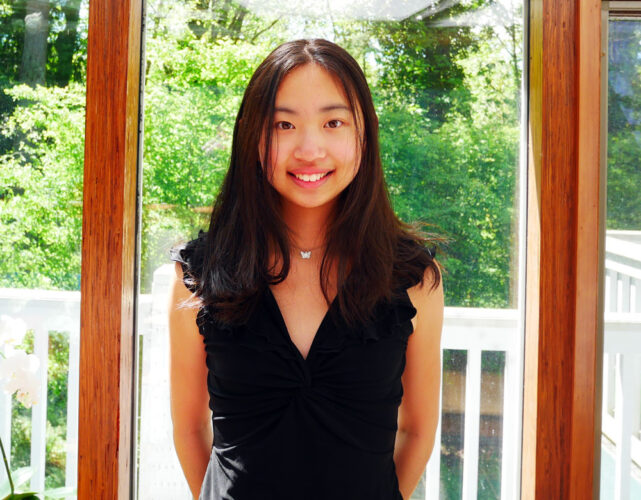
In 2019, Pinyu Liao’s grandmother died of a bacterial infection — an event that inspired Pinyu to pursue work in antibiotic resistance. She quickly learned that it’s an under-researched field because it’s not particularly profitable. So she embarked on a journey to do research on exploiting internal mechanisms within bacteria to develop a creative strategy against antibiotic resistance, which she began as an independent project conducting research from her bedroom.
From there, Pinyu continued her work through the Research Science Institute at the Massachusetts Institute of Technology and has worked with international teams through the New York Academy of Sciences and the Harvard Vision Global Health Conference to solve innovation challenges with students from around the world.
To engage the public and increase awareness of antibiotic resistance, Pinyu acquired funding from education research organization foundry10 to produce a documentary, “The Quest to Stop Antibiotic Resistance,” which was selected as part of the World Health Organization’s Health for All Film Festival.
As a first-generation American in a home run largely by a single parent, Pinyu navigated the American education system on her own. Attending a Title I school, Pinyu has put considerable work into drumming up resources outside of school to pursue her projects.
She aims to share her experiences — much of it through her blog, Lavender + Lab Coats, which garners 35,000 views monthly — to give other students the opportunity to learn from her experiences and guide them in pursuing a career in STEM. Pinyu hopes to become a biomedical scientist, and among her goals is to start a nonprofit dedicated to researching diseases that don’t receive enough resources for study, as well as to make scientific research programs more accessible to all students.
GARIMA RASTOGI, 16
Homeschool/Virtual Learning Academy Charter School ■ Concord, New Hampshire
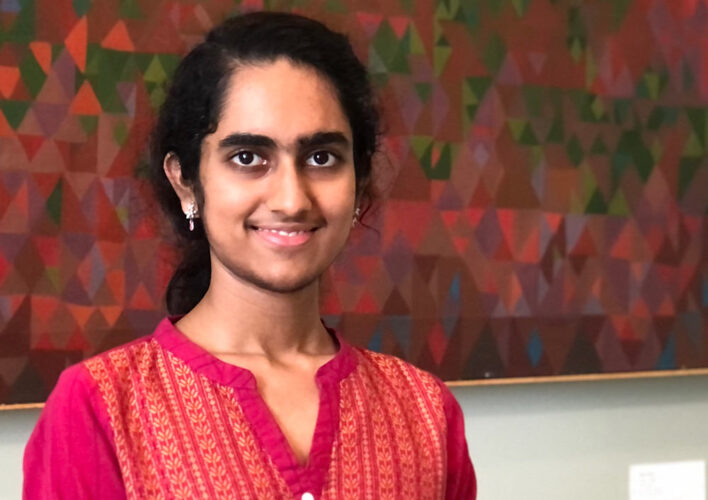
To put it simply, Garima Rastogi speaks math. As a middle schooler, Garima had already co-published peer-reviewed research papers on probability games as part of her participation in MIT PRIMES STEP, a year-long math enrichment program in which students meet with a mentor weekly at MIT for creative problem solving and research.
She’s also presented research to the American Junior Academy of Science on using machine learning to count microscopic worms, and co-published a paper on “The Stable Matching Problem and Sudoku” that notes in its abstract, “Your path to coupled life isn’t through Tinder: it’s through Sudoku! Read our fabulous paper where we explore the Stable Marriage Problem to help you find happiness and stability in marriage through math.”
Throughout her educational journey, Garima struggled to find resources in her city. So she and her siblings co-founded the Rastogi MatheMagicians Club at their local library, where they mentor elementary and middle school students who are interested in competitive math.
“Every year, numerous students in our city seek to participate in middle and high school mathematics competitions such as MATHCOUNTS and the AMC (American Mathematics Competitions) 8, 10, and 12,” the Rastogis write on their GoFundMe to fundraise for their club. “These competitions were integral to our journey in mathematics — they helped us explore our passion for the subject through extracurricular engagement as we practiced for the competition and met like-minded peers in the process. However, the schools in our community are often unable to provide many students with the opportunity to compete due to the lack of proper funding.”
CLORIS SHI, 15
Troy High School ■ Fullerton, California
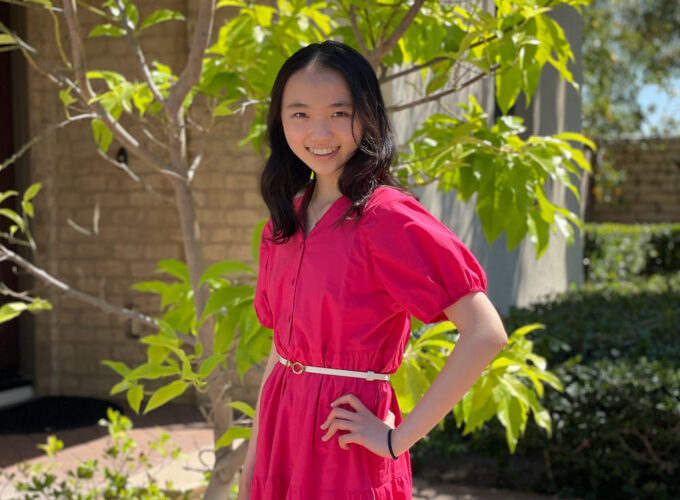
In 2020, Cloris Shi conducted research using machine learning methods to analyze the mutations of the receptor-binding domain of six different coronaviruses. Her algorithm was able to predict the genetic linkages between species of coronavirus as well as variants within a species, developing a pipeline for studying novel viruses.
Her project, “Analysis of the Amino Acid Frequencies in the Receptor-Binding Domains of Six Coronaviruses,” was recognized in the national Broadcom MASTERS top 300 projects and awarded a scholarship by the American Association for Clinical Chemistry.
Cloris also founded her school’s chapter of STEAM for All, a nonprofit that works to foster elementary and middle school student interest in STEAM fields through community service projects and by hosting fun, educational competitions. (STEAM refers to STEM plus arts.) Currently, Cloris’s club has more than 200 fully trained volunteers engaged in meaningful service initiatives with over 3,000 participants.
HARITA SURESH & SHARADA SURESH, 15 & 14
McNair Academic High School ■ Jersey City, New Jersey
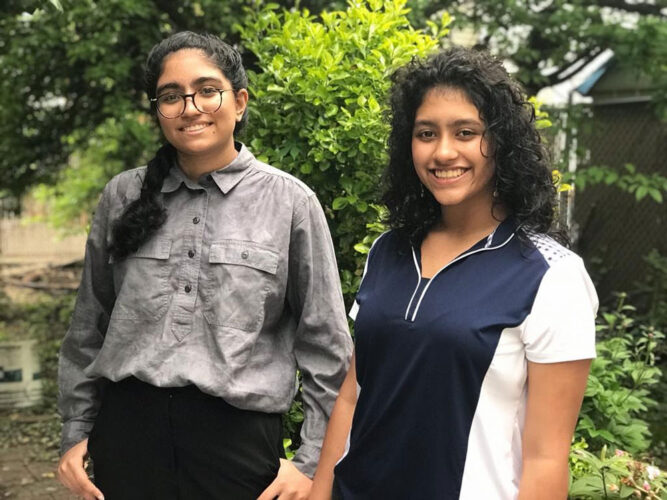
The Suresh sisters have loved technology for as long as they can remember. They both started learning to code by age 5, but realized as they got older that there are major opportunity gaps in technology fields, delineated by gender, race, geography and family income.
In an effort to overcome social barriers for students to learn computer sciences, Harita and Sharada launched Little Apple Academy in 2020, a nonprofit that offers free live coding classes online to other young people. They developed a curriculum that uses both Code.org resources as well as their own project-based approach to teach programming in Scratch, Python and JavaScript. Students do not need prior computing or coding knowledge to enroll in Little Apple Academy classes.
When schools closed during the pandemic, the Suresh sisters conducted several batches of coding classes every day, attracting students from around the world — from the United Kingdom to Kuwait to France. Many of the students wrote a program for the first time in these classes. To date, they have taught more than 450 students across nine countries.
In addition to their free classes, they also offer one-on-one tutoring lessons for a small fee, 100% of which they donate to charities within their community like BITE and The Mary House Emergency Food Pantry. They have also collaborated with the Institute of Electrical and Electronics Engineers’ Kochi Subsection to teach coding to students from 10 schools in Kerala, India.
Many students join their classes from the computer lab of GHSS Kuttamassery, a rural and underserved school in Kerala, India, supported by the IEEE Humanitarian project.
ELLIOTT TANNER, 13
University of Minnesota ■ Minneapolis
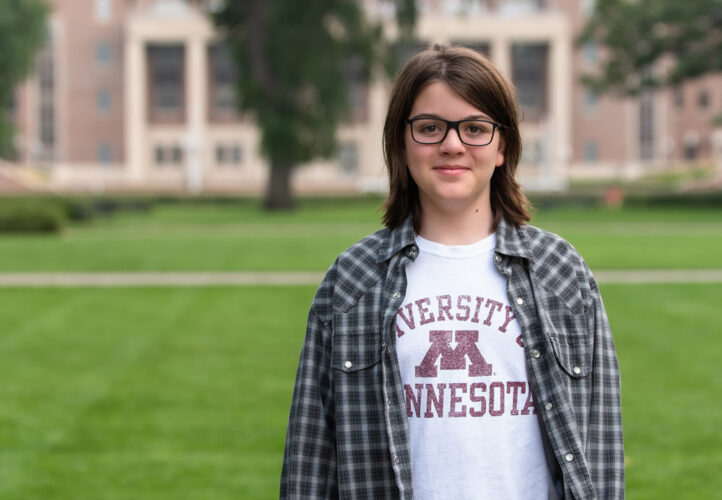
At age 11, Elliott Tanner graduated with an associate of science degree in math from Normandale Community College in Bloomington, Minnesota. This May, at age 13, he completed his bachelor of science in physics at the University of Minnesota and is continuing on to a Ph.D. program at the university this fall. He aspires to be a theoretical physicist and a physics professor in the near future.
At the University of Minnesota, he was a part of a research project working on simulation and analysis for the Short-Baseline Neutrino Program at Fermilab, which measures the properties of neutrinos — subatomic particles with no electrical charge and very little mass — as they change and move through space. The work Elliott does simulates the production of cosmic muons, particles created when high-energy cosmic ray showers interact with the earth’s atmosphere, in what’s known as the lab’s Short-Baseline Near Detector. The reactions this produces mimic the interactions that the harder-to-detect neutrinos have with the detector. Another step in this process involves determining the effects of Rayleigh scattering, the scattering of light off the molecules in the air that gives us a blue sky, on the photons, particles representing the smallest unit of light or other electromagnetic radiation, that is also emitted during the reaction.
When he’s not researching photons, muons or neutrinos, Elliott volunteers his time to tutor physics and math students at the high school and college levels.
But Elliott’s path hasn’t been an easy one. While most graduate study placements come with a financial package, Elliott was accepted without one. “We were told by other schools that he was rejected [for financial aid] because of his age,” said his mother Michelle Tanner.
“Most people don’t understand that even though he is in college, he still gets to be a kid. His educational setting just looks different. Society thinks kids like Elliott will be accepted anywhere and provided with financial packages, but it’s been completely the opposite for Elliott, and he’s been fighting to prove himself and will continue to do so for many years.”
SANJITH UDUPA, 16
Novi High School ■ Novi, Michigan
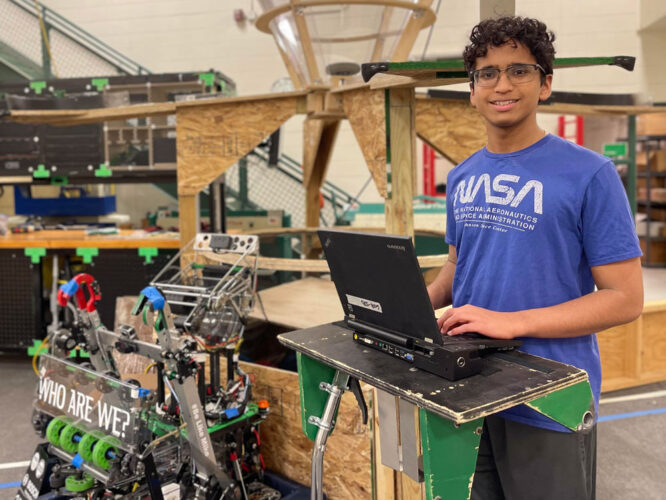
Sanjith Udupa discovered his love for teaching about technology when, as a sixth grader, he volunteered to help start and sustain FIRST Tech Challenge teams in inner-city Detroit. The program challenges teams of students in grades 7 through 12 to design, build, program and operate competition robots, all while learning engineering principles and skills in STEM, innovation and teamwork.
While being a student leader on his own school’s robotics team, Sanjith runs programming and computer-aided design workshops for students in Novi, Detroit, and virtually around the world. He maintains a YouTube channel with 2,500 subscribers, on which he teaches programming and showcases some of his projects, like Pantry Pal, an iOS app that uses machine learning and the device’s camera to identify and log items purchased from a grocery store. The app aims to minimize food waste by notifying users of upcoming expiration dates on products, and suggests recipes to use with those items.
When the pandemic hit in 2020, Sanjith and his robotics team reached out to the school district requesting use of two 3D printers to print face shields for frontline and other essential workers. They printed 1,000 face shields for district staff.
Sanjith has an “unrelenting desire to learn about technology and to teach others what he’s learned,” said Anu Udupa, his nominator and parent. “Sanjith believes that the opportunity to have meaningful STEM education is a right, as much of a right as a meaningful reading education is. That’s part of the reason he cares so much about his work in underserved communities … He wants to have an impact on students and give them the opportunities to see the same kinds of future career possibilities that he does.”
SYDNEY VAUGHN, 16
Valley Christian High School ■ San Jose, California
Sydney Vaughn’s life has been surrounded by medicine — not because it runs in the family, as no one in her immediate or extended family is in the medical field — but because her 15-year-old brother has special needs and has had 20 surgeries since birth.
For years, Sydney spent nearly every day after school accompanying her brother to appointments, which included cardiology, orthopedics, ophthalmology, dermatology and pulmonology, among others. She did exercises with him during physical therapy, practiced making words with him in speech therapy and watched him sit in the sound booth for hearing tests.
“From a young age, I was blessed to witness countless medical professionals work to help my brother,” Sydney said. “I hope to follow this template by dedicating my life’s work to patients and their families.”
Two years ago, Sydney moved with her family from Texas to San Jose, where the homeless population grew by 11% during the pandemic. During that period, Sydney led a project to study and tackle medical care for the homeless in her new community. The years-long research and planning culminated in a full-day event in which she and her peers handed out food and first aid kits, and provided simple medical care — under the supervision of a licensed physician — to homeless encampments in the city.
As a child, Sydney loved sewing pillows, which quickly turned into an interest in suturing — so much so that her parents caught her practicing suturing in the dark at midnight because she wanted “to get it right.” Sydney now chairs the Jack and Jill of America Hypertension Awareness Campaign in San Jose and interns at the Veteran Affairs Palo Alto Hypertension and Colon Cancer Clinic.
She hopes to become a physician one day, and is dedicated to providing access to health care for those living with housing instability. She hopes to soon launch her nonprofit, Breakfast with the Homies, to distribute breakfast foods to and provide medical care for the homeless.
KAVYA VENKATESAN, 15
Old Bridge High School ■ Old Bridge, New Jersey
As a national ambassador for the Society of Women Engineers and a distinguished leadership ambassador for the Harvard WECode Conference, Kavya Venkatesan is dedicated to building the nation’s female STEM workforce pipeline. She is also a board and council member for New Jersey’s Women’s Future Leadership Academy and regularly organizes STEM symposiums so that students from underrepresented groups have a platform to share their ideas and research.
She has developed strategies to mitigate the impact of climate change on her home state by creating an app, NJ X Connect, that connects individuals in low-income, coastal communities with flood relief organizations and resources in the event of an emergency. Her second app, Helios, a heat advisory system, aims to educate users about their risk of being hospitalized from heat strokes.
Kavya considers herself fortunate to have a Society of Women Engineers chapter at her school, Old Bridge High School in Old Bridge, New Jersey. “It was so great because I was able to find a network of students like me who shared the same passions, and we shared the same challenges,” she said. “Through that I realized that there’s always going to be a space and need for everyone in the STEM field.”
Kavya also collaborated with students from around the world to organize a global STEM Summit funded by Royal Society of Chemistry. Aligned with the goals of the United Nations, the three-day event was aimed at boosting the confidence, passion and influence of more than 450 young people to empower them to impact the world together. The summit featured more than 40 speakers from over 23 countries and two dozen engaging sessions on how STEM can be used to achieve the UN’s Sustainable Development Goals.
“When young people are engaged, empowered, and equal partners, any positive step or change is possible,” Kavya said.
SAMUEL WOODS, 13
Crawford W. Long Middle School ■ Atlanta, Georgia
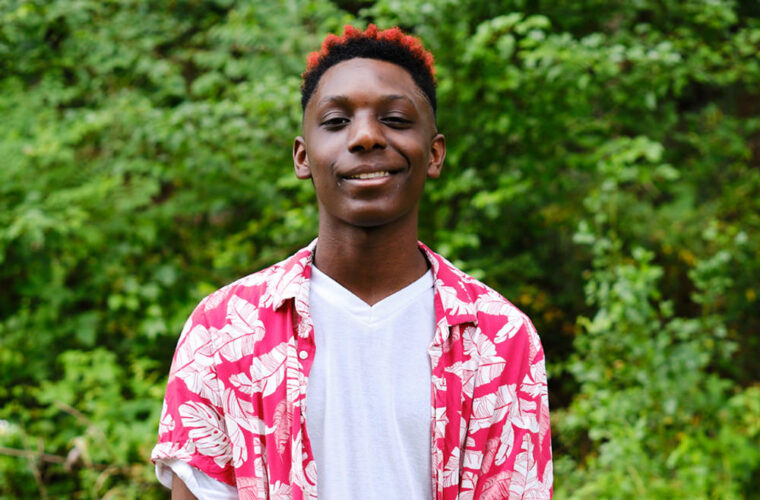
An entirely self-taught programmer, Samuel Woods is fluent in over five coding languages and teaches a coding class to other interested students. Jumping from place to place outside of school due to housing insecurity, Woods has faced tall hurdles in his tech journey. “It’s definitely been a struggle when it comes to my mission with coding,” he said.
But thanks to a STEM lab teacher with a keen eye for Samuel’s talent, and support from Verizon Innovative Learning Schools, his school was able to supply him with a Chromebook with data and a prepaid hotspot, allowing him to take his coding work home with him, no matter where home may be that week.
To date, he has programmed the “Atom Playground,” which animates the periodic table in a way that clearly illustrates every element, and earned him a second place award in the statewide Georgia Student Technology Competition in 2022. “My father’s a scientist and he uses this for work,” said Renee Dawson, Samuel’s nominator and Verizon Innovative Learning School specialist for Long Middle School.
Samuel has also worked on an app for a “green yearbook” for the school — both as an environmentally friendly alternative to a physical yearbook, but also as a way to give every student access to a yearbook, even if they couldn’t afford a traditional one. The app allows students to scroll through photos and click on pictures for bios and quotes. He’s working on an update to the app that allows students to sign each other’s yearbooks digitally as well.
Samuel sees coding as a means to solve socioeconomic problems, because “the premise of programming is about problem solving.” In the long term, he hopes to “bring more technologically innovative programs to southern schools that otherwise do not have them.”
Meet the Judges
Alex Kotran
Co Founder & CEO, The AI Education Project
Alex oversees strategy, partnerships, fundraising and external relations for the AI Education Project. Prior to founding the AI Education Project, Alex helped launch The Future Society, a 501(c)(3) AI governance think tank, spun out of the Harvard Kennedy School of Government. As interim head of partnerships, Alex developed and advanced relationships with organizations including the IEEE, UN, European Commission, OECD, Council of Europe, UNESCO, NYU Law, Stanford Law, Microsoft, Google and EY, among others. In this role, he also helped to lead the team which executed the Global Governance of AI Roundtable at the World Government Summit in Dubai, among the largest gatherings of world leaders focused on AI ethics and policy.
Prior to his time in the social impact and nonprofit space, Alex managed brand and policy communications for companies including Oracle, Airbnb, Nissan, HP, Adobe and SAP. He was a lead field organizer in Columbus, Ohio for the 2012 Obama presidential campaign and served as a presidential appointee under HHS Secretary Sylvia Burwell, where he managed communications and community outreach for ACA Open Enrollment, two SCOTUS rulings and the 2015 Ebola outbreak.
Patricia S. Johnson
Chief Program Officer, Black Girls Code
A visionary executive with a relentless commitment to racial, gender and educational equity, Patrice is a solutions-oriented expert in strategic planning, research and program management. She is a two-time author and the youngest elected councilwoman for the City of Muskegon Heights, Michigan. She recently led Boys Hope Girls Hope of Detroit as its executive director, spearheading fundraising campaigns, transformative partnerships, and program innovation to increase equitable opportunities for youth. The organization launched the first-of-its-kind, 21st Century Urban Boarding Program for girls of color in Michigan. She continues to lead impactful work as chief programs officer for Black Girls Code.
Mason Tang
Engineering Manager, Grammarly
Mason is a software engineering manager who is trying to make the world a better place by solving problems at the intersection of people and technology. He has spent the past 10 years leading and growing engineering teams at Google and Airtable with a consistent focus on fostering thoughtful positive impact, collaborative problem-solving, and inclusive and supportive environments.
At Google, Mason helped shape some of the core infrastructure behind Google Search, built and led teams developing AI-powered health care products and most recently worked on new projects pushing the boundaries of modern Search experiences. At Airtable, Mason was responsible for building and leading the Enterprise Engineering team, working closely with Sales and Customer Success to develop product features for Airtable’s largest and most strategic customers.
Mason graduated from the Massachusetts Institute of Technology with a B.S. and a master’s in computer science and engineering. Outside of tech, you can often find him cooking, baking, dancing, singing, or trying some mildly hazardous combination thereof.
The 16 Under 16 in STEM project was produced in part with the support of the Overdeck Family Foundation.
Get stories like these delivered straight to your inbox. Sign up for The 74 Newsletter

